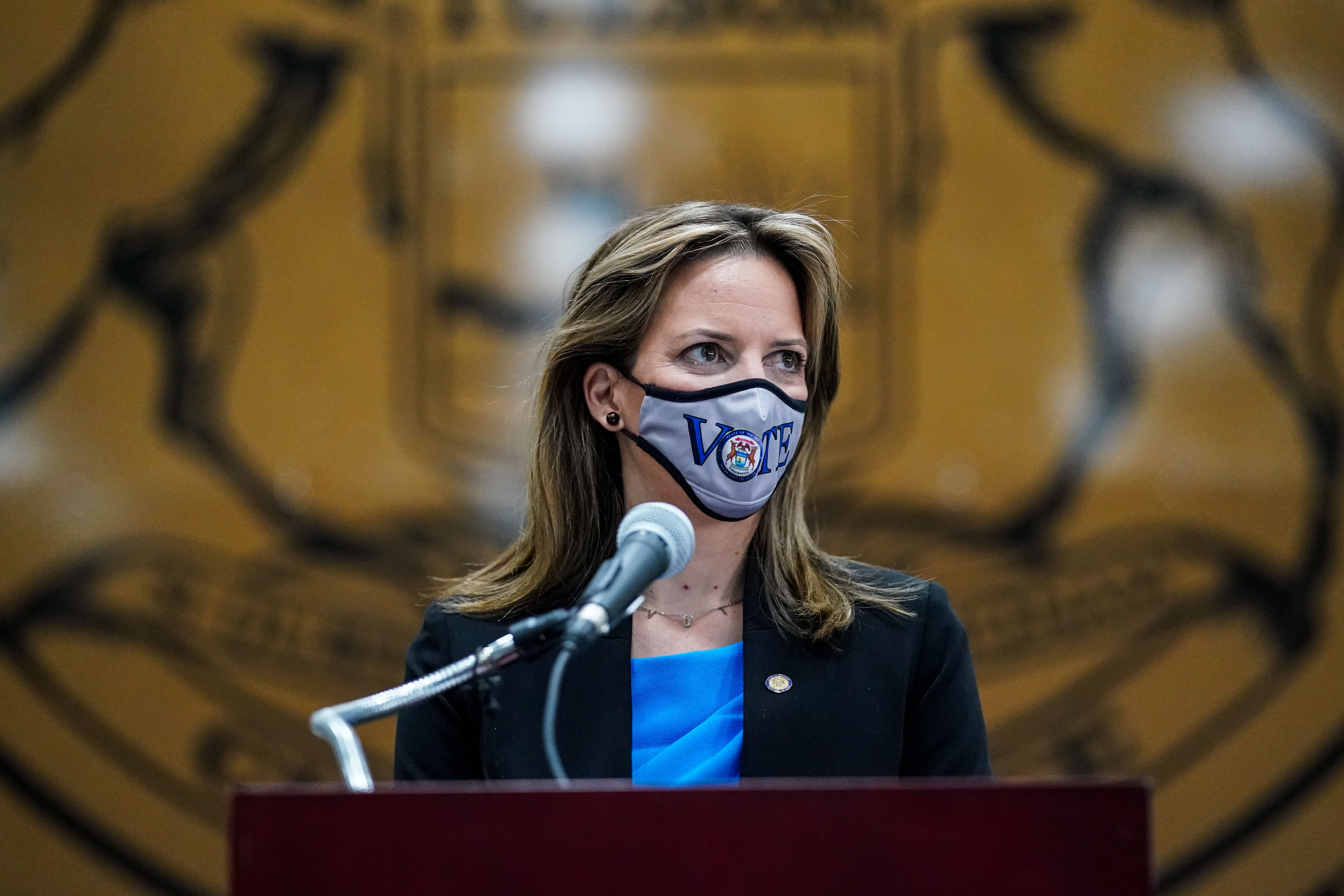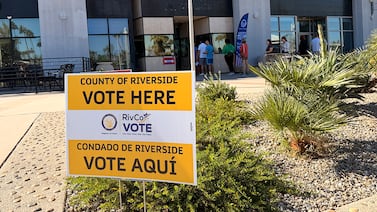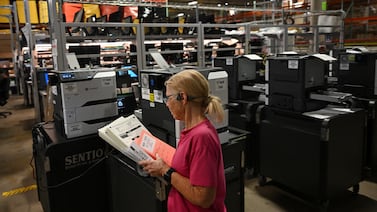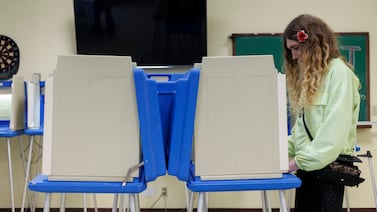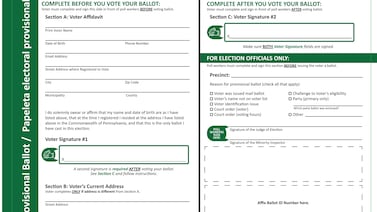A version of this post was originally distributed in Votebeat’s weekly newsletter. Sign up here.
Votebeat broke two pieces of news Friday: first, that 14 state election chiefs had written directly to Speaker of the House Nancy Pelosi and Senate Majority Leader Chuck Schumer this week asking for $20 billion in federal election funding, and second, that Democratic legislators designing the budget reconciliation package had originally planned for $10 billion in election funding, dispersed over 10 years—but at the last minute, Pelosi yanked it because, Hill staffers said, she thought the funding would decrease the motivation behind the For the People Act.
Absent some sudden change of heart during the appropriation process this fall, this means election administrators again will be left holding the bag, forcing ancient machines to count votes and depleted staff to work long hours while the Democrats figure out their voting rights strategy. And in the meantime, the environment for the next elections is looking grim. Hostilities against election administrators haven’t stopped, so a bipartisan group of some of the nations’ best election law minds have banded together to create an initiative to provide legal support for administrators, “to help election officials from both parties deal with harassment stemming from Donald Trump’s grievances about the 2020 election and new state laws that restrict their authority,” reports Bloomberg. The Department of Justice has launched an initiative to investigate and address this harassment, but given its scale, that’s going to take some time — even if we assume the feds can make a meaningful impact. Reuters identified 100 threats of violence against these workers. “The response so far: only four known arrests and no convictions.”
Given these challenges, it’s surprising that Pelosi would be so willing to take the funding out of the reconciliation package. She has, after all, praised election officials and spoken out against their harassment. In past years, she excoriated Republicans for not providing appropriate election infrastructure funding. 2021 — multiple election administrators told me — was finally going to be their year. And then, it wasn’t. When I was at the National Association of Secretaries of State conference in Des Moines a few weeks ago, a lot of the attendees were shell-shocked to see the final version of the budget resolution, announced earlier in the week. One administrator said they were “heartbroken.” Another, a Democrat who’d worked directly with multiple groups on advocating for the funding, said, “I don’t really know where we go from here.”
Pelosi removed the planned spending, according to staffers and officials involved in the talks, because she felt it would take momentum away from the For the People Act, which — as I’ve written before — contains provisions that election officials say they can’t implement given the bill’s tight deadlines and lack of funding. So, while voting rights advocates might be enthused about the dedication Pelosi has shown for this bill, cash-strapped election administrators feel their last, best chance at funding has been thrown in the trash in service of a bill with a snowball’s chance in hell of passage.
Additional challenges to elections abound across the country: The Texas elections bill contains language that election administrators repeatedly asked to change and that will make their jobs needlessly more difficult — for example, a provision requiring voting machines to use CD drives to store vote data (that’s what the language means here) by 2026. In Pennsylvania, Wisconsin, Georgia, and Arizona, “forensic audits” have either already started or gotten a heck of a lot of public attention, with almost no attention paid to the county officials’ loud warnings about the lack of reliability of such audits and the clear negative impact on public confidence. At all levels, the voices of election administrators who maintain the franchise have been ignored.
Back Then
Today’s internal party squabbling is not the first time voting advancements have been squandered. Just as the Democratic Party is internally battling over the future of the For the People Act and the John Lewis Voting Rights Advancement Bill, Republicans in the 1880s — a time when they were the party of voting rights — messed up an opportunity to meaningfully help elections. At that time, the federal government had essentially given up on federal voting rights enforcement in the South, allowing for mass election fraud by white Southerners and disenfranchisement aimed at keeping Black voters out of the polls. The Federal Elections Bill, written by a faction of Republicans intent on safeguarding the right to vote, would have given courts and appointed supervisors more authority to ensure local jurisdictions followed federal election rules. But another faction of Republicans felt it was too prescriptive, and that policy focus should be directed elsewhere. It never came to a vote in the Senate. In the House, it failed. Not a single Democrat voted for it, and several Republicans broke ranks to vote against it. This split had, in many ways, been bubbling up since Reconstruction. A flank of the Republican Party was committed to civil rights as an ideal, but many were far more focused on issues of economic advancement they felt would eventually win over white voters in the South.
In Other Voting News
- Republican lawmakers in Pennsylvania began a “forensic audit” Thursday of the state’s 2020 results. As the Philadelphia Inquirer has reported, we have no idea what that means. Republican Sen. Cris Dush said the goal is not to overturn the results of the election (“That horse is out of the barn, as far as this investigation is concerned,” he said.) but instead to see if the system needs improvement. That reasoning is a bit baffling given that Republicans used the same justification this spring to hold 10 hearings aimed at identifying election reforms. House State Government Committee Chair Seth Grove, a Republican, called these hearings “one of, if not the most, comprehensive reviews any state has undertaken.” It remains unclear when Senate Republicans will begin this audit, if they already have, and what they’ll be doing.
- North Carolina Republicans have not included $2.8 million in already-distributed federal funding for elections in their proposed budgets for the upcoming year. The feds gave $11.6 million to the state last year in a bipartisan effort to boost election spending during the pandemic. Much of it was spent, but the Board of Elections now must get the Legislature’s approval to use the remaining unspent funds. None of the North Carolina lawmakers would explain their reasoning for the exclusion, and election administrators are now concerned they may lose the funding permanently. “That’s pure politics; there’s no other motive there,” Matt Masterson, a former election security official during the Trump administration, told Carolina Public Press.
- A problem that has long plagued Arizona elections might be a distant memory soon, if Arizona Secretary Katie Hobbes can pull off her new plan, but she’s got to get the state’s Republican governor and attorney general on board. Right now, if you cast an out-of-precinct provisional ballot in Arizona, the entire ballot is rejected. Hobbes’ proposal would require those ballots to be partially accepted. For any race on the ballot that the voter was legally eligible cast a vote for (such as a statewide race) that vote would be counted; for races in which they should not have cast a ballot (for example, a city council district they do not live in), the vote wouldn’t be.
- Three activist organizations in Montana have filed a lawsuit against the state, saying that a series of bills signed into law in the last year represent a “cocktail of new voter suppression measures.” The groups say that many of the features of the bills passed this year target youth voters specifically: Student ID must now be augmented with a second ID when voting, and ballots are no longer mailed to voters who have not yet turned 18 but would by election day. The groups — Montana Youth Action, Forward Montana Foundation, and the Montana Public Interest Research Group — say that the provisions will have a negative impact “on the ability of Montana youth to remain active and engaged participants in democracy.”
- In Colorado, Mesa County Deputy Clerk Belinda Knisley has been charged with felony burglary and misdemeanor cybercrime, for allegedly entering the county clerk’s office without authorization and attempting to steal documents. Her boss, County Clerk Tina Peters, is the subject of separate investigations involving the illegal sharing of images and passwords from the Mesa County voting system with conspiracy theorists. The Colorado secretary of state has sued to remove Peters from her duties as chief election official, but Peters cannot be placed on leave because she is an elected official. Knisley, who is accused of intimidating office employees and telling them not to cooperate with the investigations into Peters, is not an elected official and was placed on leave on Aug. 23. She turned herself in to authorities on Sept. 1 after she entered the office and attempted to log into Peters’ computer with her credentials to print documents, unsuccessfully.
- Early voting for California’s recall election of Gov. Gavin Newsom is under way. And leading up to Tuesday’s final day of voting, the California Republican Party has wasted no time making baseless claims of voter fraud — even rolling out a spot on its website to make reports. CalMatters has an excellent explainer separating fact from fiction.
- ProPublica has an eye-opening report about the far right’s “precinct strategy,” which has gained momentum this year thanks to Steve Bannon’s vocal promotion. By securing leadership positions in the GOP’s county and precinct apparatus, Trump loyalists aim to take control of election administration from the ground up. In 41 of the politically competitive counties ProPublica studied, reporters found a surge of 8,500 new Republicans had signed up as precinct officers, with clusters in Florida, Texas, Georgia, and Pennsylvania.
- In New Jersey, the Atlantic County Board of Elections may have to move “scanning equipment, office furniture and more than 140,000 paper ballots cast in the 2020 election” out of its rented warehouse because of the landlord’s $100,000 in unpaid electric bills. The board of elections rented the warehouse to store the additional equipment necessary to ramp up vote by mail during the pandemic, and officials had intended to use it again during the upcoming general election. The county has asked the electricity company to consider keeping the power on through the end of the year.
- A U.S. district judge verbally slapped down Lin Wood and Sydney Powell in a ruling a few weeks ago, calling their lawsuits related to voter fraud in 2020 an abuse of the court’s role and requiring them to pay the associated fees. Now, Wood and Powell have been presented with a bill for Michigan’s legal fees: $204,000. Per the AP: “Detroit was represented by lawyers in private practice. They’re seeking $182,000. The Michigan attorney general’s office is requesting about $22,000.”
Good Idea of the Week
I still require more hobbyist submissions so that we can continue to feature what election folks do in their downtime. Please send me your hobbies!
In the meantime, I come to highlight a good idea: Josh Daniels, the clerk in Utah County (home to Provo), hosted an election-transparency night this week because of an “influx” in public records requests associated with the election. “Election officials are under more scrutiny than ever before,” Daniels told KUER. “They’re being asked questions they’ve never been asked before. There’s public records requests that are at an all-time high. So [we’re] just trying to be proactive and host an event like [this] to get out ahead of it and share what we do and answer questions.” He answered questions about the county’s system, and attendees were allowed to interact with the voting technology used by the state.
One 18-year-old voter at the event said, “I think everyone is reasonably suspicious when you put a paper in the mail and then it gets counted for an election, but the discussion tonight was illustrative of all the work and expertise that goes into the process, which helped me.”

